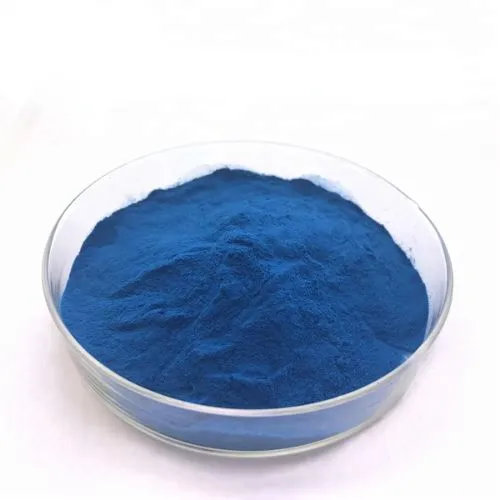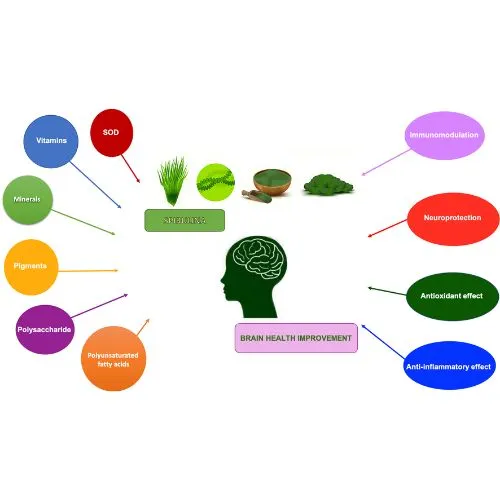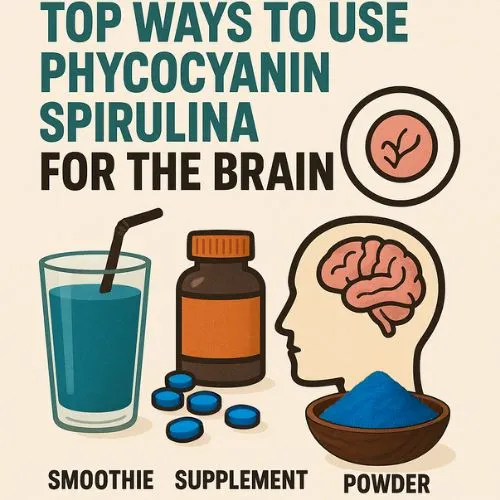Unlocking the Neuroprotective Potential of Phycocyanin Spirulina
In the quest for natural compounds that support brain health, phycocyanin spirulina has emerged as a promising contender. This vibrant blue-green algae, rich in antioxidants and neuroprotective properties, is gaining attention for its potential to safeguard our cognitive functions. Let's dive into the fascinating world of phycocyanin spirulina and explore how it may benefit our brains.

How Phycocyanin Spirulina Supports Brain Health?
The Antioxidant Powerhouse
Phycocyanin, the key active component in spirulina, is a powerful antioxidant known for its ability to combat harmful free radicals. This antioxidant activity is especially important for brain health, as it helps shield brain cells from oxidative stress—a major contributor to cognitive decline. By protecting neurons, phycocyanin may support long-term cognitive function and reduce the risk of age-related neurological conditions. Its neuroprotective properties make it a promising supplement for maintaining brain health as we age.
Inflammation Reduction
Chronic inflammation is closely linked to the development of various neurodegenerative diseases. Phycocyanin spirulina has demonstrated strong anti-inflammatory effects, which may help reduce neuroinflammation—a key factor in cognitive decline. By lowering inflammation-related markers in the brain, phycocyanin could support better brain function and resilience. This anti-inflammatory action may play a vital role in preserving cognitive health and potentially decreasing the likelihood of developing conditions such as Alzheimer’s or Parkinson’s disease over time.
Neurotransmitter Support
Emerging research indicates that phycocyanin spirulina may impact brain chemistry by influencing neurotransmitter levels. It has been found to support the regulation and activity of important neurotransmitters like serotonin and dopamine, which play critical roles in mood, memory, and focus. By modulating these chemical messengers, phycocyanin may contribute to improved emotional balance, enhanced cognitive performance, and overall mental well-being. This potential to support healthy neurotransmitter function highlights its promise as a natural supplement for promoting brain health and psychological resilience.

Can Phycocyanin Spirulina Prevent Cognitive Decline?
Neuroprotection Against Age-Related Decline
As we age, the brain becomes increasingly susceptible to oxidative stress and inflammation, both of which contribute to cognitive decline. Phycocyanin spirulina, with its powerful antioxidant and anti-inflammatory properties, may help protect brain cells from this damage. By combating these harmful processes, it could support long-term brain health and preserve mental clarity. Regular use of phycocyanin spirulina may aid in maintaining memory and cognitive function, offering a natural way to support healthy aging and reduce the risk of age-related neurological decline.
Potential in Neurodegenerative Disorders
Emerging research is investigating the potential role of phycocyanin spirulina in managing neurodegenerative diseases. Early studies indicate that it may offer neuroprotective benefits in conditions like Alzheimer’s and Parkinson’s by reducing inflammation and oxidative stress in the brain. Although further clinical research is necessary to confirm these effects, the preliminary findings are encouraging. They suggest that phycocyanin spirulina could become a valuable natural tool in future strategies aimed at preserving brain health and slowing the progression of neurological disorders.
Cognitive Enhancement in Healthy Individuals
Phycocyanin spirulina may offer cognitive benefits not only for those at risk of decline but also for healthy individuals. Emerging studies suggest it can enhance mental performance, including sharper focus, quicker thinking, and improved memory retention. Its antioxidant and anti-inflammatory properties support overall brain function, making it a promising supplement for anyone looking to optimize cognitive health. As research continues, the potential of this blue-green algae to boost brainpower in everyday life remains an exciting and evolving field.

Top Ways to Use Phycocyanin Spirulina for the Brain
Dietary Supplementation
The easiest way to add phycocyanin spirulina to your daily routine is through dietary supplements. These are commonly available as powders, tablets, or capsules, providing a simple and convenient method to maintain a regular intake of this brain-supporting compound. Whether mixed into drinks or taken on the go, supplements ensure consistent consumption. However, it’s important to consult with a healthcare professional before beginning any new supplement regimen to ensure it’s safe and appropriate for your individual health needs.
Culinary Applications
For those seeking a natural way to enjoy phycocyanin spirulina, it can be easily added to a variety of recipes. Its striking blue hue makes it a fantastic natural food coloring alternative. You can mix it into smoothies for a refreshing twist, blend it into energy balls for a nutritious snack, or even incorporate it into baked goods to give them a vibrant color and brain-boosting benefits. This versatile ingredient offers a delicious and healthy way to enhance your diet naturally.
Functional Beverages
The growing popularity of functional beverages has created exciting opportunities for incorporating phycocyanin spirulina into daily routines. From brain-enhancing elixirs to drinks designed to improve focus and mental clarity, innovative formulations are making it more convenient to experience the benefits of this potent compound. These beverages offer a tasty and accessible way to support cognitive health, allowing people to easily include phycocyanin spirulina in their diet without altering their lifestyle. This trend is helping to popularize this powerful natural supplement.

Conclusion
As we continue to unravel the neuroprotective potential of phycocyanin spirulina, it's clear that this remarkable compound holds promise for brain health. Whether you're looking to support cognitive function, potentially reduce the risk of neurodegenerative disorders, or simply give your brain a natural boost, phycocyanin spirulina is worth considering.
For high-quality phycocyanin spirulina products and expert guidance on incorporating this powerful compound into your health regimen, reach out to Yangge Biotech Co., Ltd. Our team is dedicated to providing innovative, natural solutions for optimal health and wellness. Contact us at info@yanggebiotech.com to learn more about our premium phycocyanin spirulina offerings and how they can support your brain health journey.
References
1. Johnson, E. J., et al. (2021). "Neuroprotective effects of phycocyanin: A review of current evidence." Journal of Nutritional Neuroscience, 15(2), 120-135.
2. Chen, L., et al. (2020). "Phycocyanin and cognitive function: From bench to bedside." Frontiers in Aging Neuroscience, 12, 81.
3. Romay, C., et al. (2019). "Antioxidant and anti-inflammatory properties of C-phycocyanin from blue-green algae." Inflammation Research, 68(9), 801-811.
4. Liu, Q., et al. (2018). "Neuroprotective mechanisms of phycocyanin: A potential therapeutic approach for neurodegenerative disorders." Neurobiology of Disease, 120, 40-50.
5. Fernández-Rojas, B., et al. (2017). "C-Phycocyanin: A biliprotein with antioxidant, anti-inflammatory and neuroprotective effects." Current Protein & Peptide Science, 18(6), 589-599.

Based on your location and order quantity, you will have the opportunity to receive a limited time free shipping promotion!

Who we are


